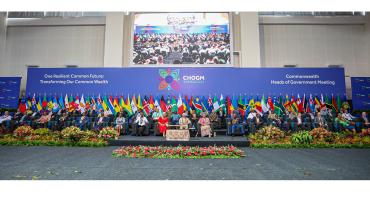Commonwealth Secretary-General Kamalesh Sharma addresses military officials from around the world at the Royal College of Defence Studies
The Commonwealth advances the dignity and opportunity for the average citizen by working with governments, civil society and development partners, said Commonwealth Secretary-General Kamalesh Sharma.
“The Commonwealth is a value-based association which can bring about great global good for its members, working for the well-being of its people. Our work is multi-pronged politically, economically and socially. The Commonwealth works to strengthen institution-building, improve judicial services and the human rights commission and creates constitutional improvements,” explained the Secretary-General.
“The Commonwealth is a homogenous body that enables us to work together with the similarities in our education system, our legal and political systems.
“Whatever we do in the world, we have some irreducible principles: this is equity, transparency, fairness and benefit for all, and this is the benchmark against which we work. So quite completely, we have been able to keep the idea alive that small human communities and big human communities have the same right to be heard in the international system. We’ve worked with them in debt, we’ve worked with them in trade, we’ve worked with them in climate change, we’ve worked with them in human rights and kept alive this idea of small and big. It’s a function of number, but not a function of aspiration."
Addressing 60 senior military officials from around the world at the Royal College of Defence Studies in London, UK, on 2 October 2012, the Secretary-General highlighted that the Commonwealth offers a platform for its 54 member countries from the developed and developing worlds to have an equality of voices. For the Commonwealth’s 32 small states, Mr Sharma said they are able to speak with confidence despite their small geographical size, as well as the small size of their populations. These small states can also have big ideas to share with other member countries. This is the intellectual capital that the Commonwealth brings to the global community, and often the ideas are ahead of their time, stated the Secretary-General.
He cited the example of the Langkawi Declaration on Environment of 1989, which was initiated ahead of the Rio Declaration on Environment and Development of 1992, to develop a global partnership for sustainable development, giving priority to least developed and developing countries. The Commonwealth’s focus on debt management, debt and fiscal responsibility and debt relief contributed to the Heavily Indebted Poor Countries Initiative of the World Bank, he pointed out.
“The Commonwealth promotes great global wisdom from our very diverse community across the world,” said the Secretary-General.



